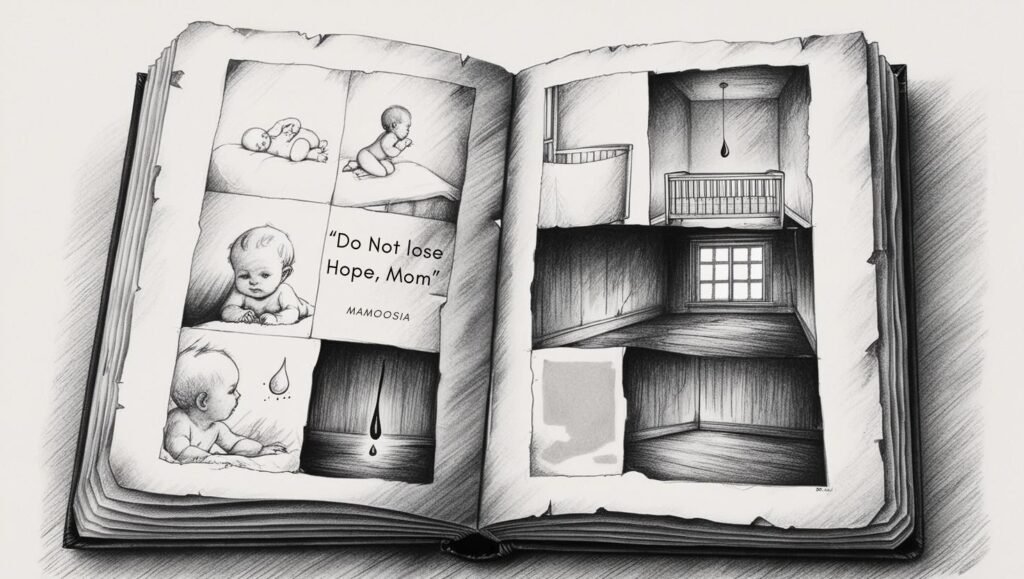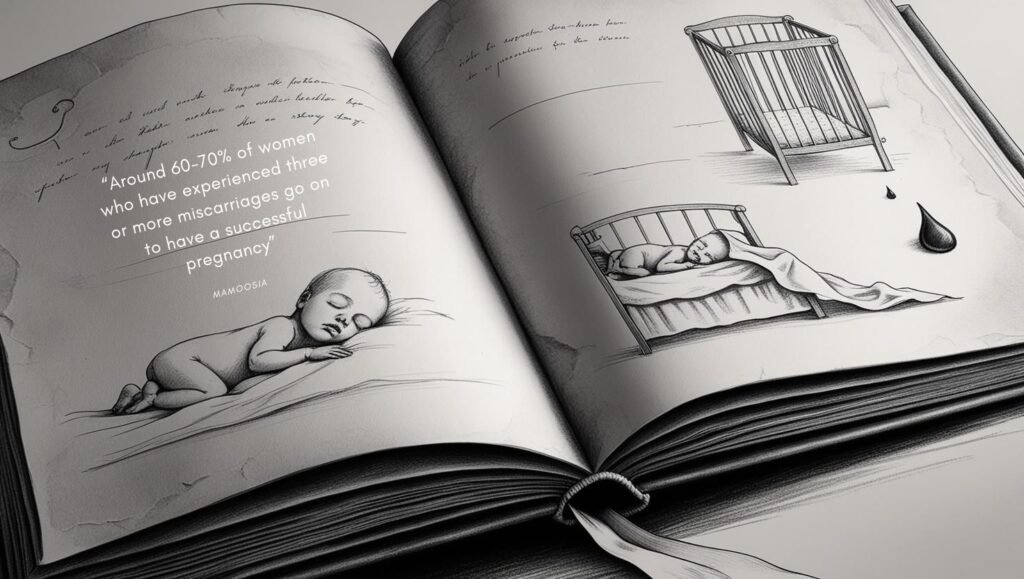
As soon as I had that fourth recurrent miscarriage, I went straight to the GP and pretty much demanded to be referred to a consultant. Luckily, she was very understanding and referred us without question or much of a fight.
I had four miscarriages in a row. You can be referred after three miscarriages if you’re in the UK but we did not get referred after three recurrent miscarriages because we had one successful pregnancy before.
I was referred to the infertility consultant at my local hospital, and we had to wait around 8 weeks for that appointment to come through. Now, in that time between the fourth miscarriage and when the appointment was going to happen, it took me 50 days to even ovulate—so a long time for my cycle to get back to normal. We didn’t end up conceiving that cycle anyway, so we ended up conceiving on the first proper cycle after the miscarriage.
Getting Pregnant after 4 Recurrent Miscarriages
In that timeframe, between waiting for our appointment to come through and then receiving our letter, which took about a further two weeks, I ended up falling pregnant. Because of our history, and you will understand this if you’ve been through three miscarriages, you don’t get very excited, do you, when you get a positive pregnancy test?
My husband was bathing a toddler in the bath, and I took a pregnancy test. I walked into the bathroom and said something along the lines of “I’m pregnant again,” he said, “Okay,” and that was about it. We were so beaten down by our losses that we didn’t think anything would stick.
I wasn’t very positive about the whole thing, and we just decided to wait for the consultant’s appointment to see what he would say and go from there. I didn’t even know if I was going to be able to keep the pregnancy until that appointment in two weeks.
Medication for Recurrent Miscarriages
I found out that I was pregnant around the four-week mark. It was a couple of days after my missed period that I took the test, which again is totally unlike me because I normally pee on the stick and take tests religiously from about 8 days past ovulation when I have had a positive that early before. So I was a few days after my missed period.
We went to see the consultant when I was around six weeks old. I hadn’t been to see the GP when I found out that I was pregnant because I knew I had an appointment with the consultant, but I definitely would have contacted the GP to let them know because I wanted to be able to start on some medication.
Unfortunately, our appointment with the consultant was obviously to test to see if there were any underlying issues, and because I was pregnant at the time of the appointment, we weren’t able to be tested to see if there were any underlying issues. So it was a little bit of a process of stabbing in the dark. They didn’t know which medications specifically to prescribe to us.
Unlike a friend I had who was going through a similar thing, she had already been diagnosed with a blood clotting disorder, so she was able to get a specific medication for that. So it is just something to bear in mind if you’re waiting for your appointment and you want to know if you have any specific underlying conditions. If you are pregnant when you go for that appointment, you won’t be able to get tested—you’ll have to wait until either the pregnancy is successful or, unfortunately, if it’s unsuccessful, then go back again for testing.
The consultant was nice. When we told him that I was pregnant, although I was very much of the mindset of, “It’s not going to stick anyway, so you know, whatever,” he was nice about it. The consultant decided to give us an early scan at 7 weeks, which was the next week, and then he put in for us to have early scans for the next few weeks up until I was 12 weeks pregnant to be able to reassure us.
Early Pregnancy Support
There’s been quite a lot of research done on the amount of support and reassurance given in early pregnancy and how that makes a big difference for successful pregnancies. It’s something interesting to look into if you are suffering from recurrent miscarriages. Sometimes, that level of support from midwives, GPs, and other healthcare professionals can be enough to make your pregnancy a success.
So we were given medication, given the early scan, and sent on our way. The following week, we went for our early scan, and I was the most nervous I have ever been in my entire life—the most nervous I’ve ever been for anything. I remember thinking that this was worse than taking my driving test.
Up until that point—maybe my first job interview. This was like 10 times worse. I was an absolute wreck. I didn’t even know if I was going to be able to get into the room. I was shaking, I felt sick, and I was thinking, “Do I feel sick because I’m pregnant, but is that a good sign, or do I feel sick because I’m just so nervous?”
But we went in, and although I was convinced we weren’t going to see anything on the screen (because that had been the case before for us), we saw a little bean with a heartbeat, who turned out to be our boy, Rupert. Then, of course, after that 7-week scan, we went back every week until I was 12 weeks pregnant. The sonographer thought it was very strange that we kept going back. I don’t think it was a normal thing to have scans every week, but of course, that was something that our GP had allowed us to do, and certainly, we were very grateful for it.
Regular Midwife Appointments

When I saw my community midwife, it was around 10 or 11 weeks. I put off making the booking appointment for a little while because I didn’t know what was going to happen, and I didn’t want to have to make it and then cancel it, because I’ve been in that situation before, and it’s never nice to have to do that. My midwife was so good with me, she listened and understood when I talked about the recurrent miscarriages, and she was keen to give me additional support as well.
Often, in your second pregnancy, you aren’t seen as much as in your first, but she saw me just as much as in my first pregnancy throughout the whole of my pregnancy.
Successful Pregnancy After 4 Miscarriages in a Row
Towards the end of my pregnancy with Rupert, I was incredibly anxious because I wanted a successful pregnancy after 4 miscarriages in a row. She (midwife) not only saw me every week, or I think even a couple of times a week towards the end, but we also agreed to induce. They were going to induce me on my due date, but we decided to wait a few days after because I was due on the 23rd of December, and I didn’t want a Christmas Day baby if we could help it. And delivery was successful and I got a new son named Rupert.
My Advice for Women having Recurrent Miscarriages
If you are having trouble getting referred to a consultant or getting your GP to listen to you, if you are suffering from recurrent miscarriages, or if you have been referred and you don’t think you’ve been listened to properly, then I would recommend that you contact Tommy’s.
They are a charity based in the UK, and they’re experts in pregnancy loss and stillbirth. They have a whole team dedicated to recurrent miscarriages. There are a few centers throughout the UK with doctors who specifically research recurrent miscarriage as their passion and field of expertise, and you can be referred to one of those centers throughout the UK if your GP will not refer you to your local hospital.
I would also recommend going over to BabyCenter or Channel Mum and speaking to other people on their recurrent miscarriages forums who have been through recurrent miscarriages or just miscarriages in general. If you haven’t already, it’s good to have support from other people who are going through it to ask questions.
FAQs:
Why does my wife keep having miscarriages?
Recurrent miscarriages can be caused by health issues like hormonal imbalances, uterine abnormalities, or autoimmune disorders, as well as lifestyle factors such as smoking or obesity. Genetic problems, infections, and age also play a role.
Why easily a woman gets pregnant after recurrent miscarriages?
After a miscarriage, your body may quickly return to its normal fertility cycle, with ovulation often occurring shortly after. Hormones may regulate faster, and the uterus is usually ready to support a new pregnancy.
What percentage of women had successful pregnancies after miscarriages?
Around 60-70% of women who have experienced three or more miscarriages go on to have a successful pregnancy. However, success depends on addressing any underlying causes.
My Chemical Pregnancy Story and Miscarriage.